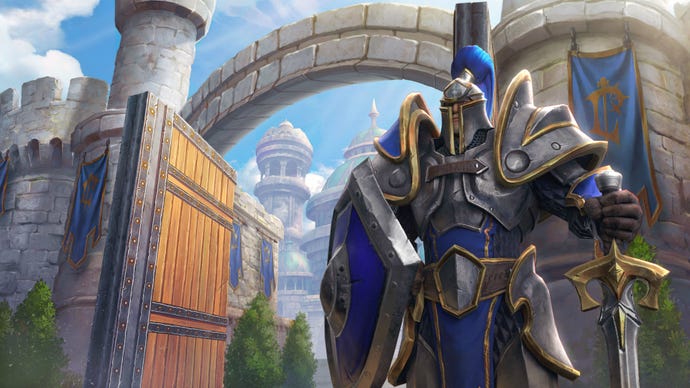Blizzard is Taking Extra Steps to Ensure It Owns Your Warcraft 3: Reforged Custom Games
They won't miss the MOBA train twice.
This article first appeared on USgamer, a partner publication of VG247. Some content, such as this article, has been migrated to VG247 for posterity after USgamer's closure - but it has not been edited or further vetted by the VG247 team.
Warcraft 3 was a landmark strategy game; some might even call it the best strategy game Blizzard ever made. But it was a landmark for another reason, too: its custom game scene spawned and popularized a number of new strategy-adjacent games, including the ever-popular MOBA genre.
When a Custom Game called "Defense of the Ancients" became popular, it started a gold rush. Embroiled in the middle of it was Blizzard, who tussled over its copyright protections with Valve, who wanted to use the "Dota" name for a proper sequel. All the while, League of Legends flourished, Dota 2 eventually became its number one rival, and Blizzard arrived late to the party. This time around, it seems like Blizzard is hedging its bets.
In the updated "Custom Game Acceptable Use Policy" for Warcraft 3: Reforged, Blizzard outlines the exact relationship it has with its custom content creators in the first point, marked Ownership. Here's an excerpt:
"Custom Games are and shall remain the sole and exclusive property of Blizzard. Without limiting the foregoing, you hereby assign to Blizzard all of your rights, title, and interest in and to all Custom Games, including but not limited to any copyrights in the content of any Custom Games. If for any reason you are prevented or restricted from assigning any rights in the Custom Games to Blizzard, you grant to Blizzard an exclusive, perpetual, worldwide, unconditional, royalty free, irrevocable license enabling Blizzard to fully exploit the Custom Games (or any component thereof) for any purpose and in any manner whatsoever."
The policy goes on to outline other basic tenets for creators, including third-party content copyright claim protections. This is to account for original DotA having a number of third-party assets, including a character named "Lina" after a popular anime, and a blue lion who looked an awful lot like Final Fantasy X's Kimahri.
But besides protecting Blizzard from missing out on a piece of the pie if an autobattler bonanza breaks out again, there are some surprisingly modern considerations taken here for custom game developers. Though it strictly mandates that custom games should be available to all players, and that custom games cannot be "sold, licensed, or rented," nor can they contain features that would support "purchase transactions of any tangible or intangible content," there is some coverage for development costs.
In a section marked Donations for Custom Game Development, Blizzard says that it recognizes the time and resources necessary to make Custom Games "can sometimes be substantial." To that effect, Blizzard is allowing funding for development costs through donations, with a few restrictions: donors cannot receive in-game advantages or other special perks, including private access or special levels. "All users are to be able to play the same custom game," Blizzard writes.
Blizzard also mandates that corporations, LLCs, partnerships or otherwise cannot be listed in credits, only individuals. Alongside a few other requirements, it also says it reserves the right to demand cessation of requests for funding at its discretion.
While these might seem strict, for obvious reasons, it is at least a step towards allowing custom game creators to make money on their own creations. If your average player decides to make a custom game that takes up 10 to 15 hours of their week, they can theoretically open some sort of Patreon to recuperate costs.
Where this gets tricky is if a game mode takes off and skyrockets in popularity, similar to the way MOBAs and autobattlers both have in the past. Blizzard has had some success with community creation in the past, but Warcraft 3 represents some of its largest missed opportunities in that respect, and now it seems like the company is ensuring it won't miss the jump-off again.
Hopefully that doesn't deter more creatives from getting involved in the scene. While the prospect of making a living off your cool custom game concept is certainly appealing, the catch that Activision Blizzard will step in and take a large chunk of the pie if takes off might be a deterrent, especially in a time where game engines are fairly available.



